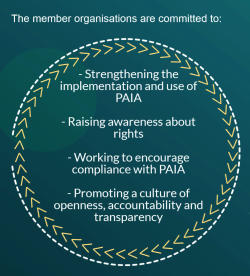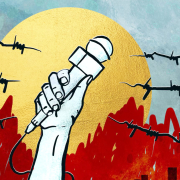|
Getting your Trinity Audio player ready...
|
 Around the same time that the International Day to End Impunity was commemorated, the PAIA Civil Society Network (PAIA CSN) released its annual shadow report on compliance with the Promotion of Access to Information Act (PAIA) (2 of 2002).
Around the same time that the International Day to End Impunity was commemorated, the PAIA Civil Society Network (PAIA CSN) released its annual shadow report on compliance with the Promotion of Access to Information Act (PAIA) (2 of 2002).
The CSN is a group of organisations and individuals working to advance the right of access to information, and achieve a culture of openness and accountability through the effective implementation of the act.
Its shadow reports complement the work of the South African Human Rights Commission in monitoring and implementing PAIA. The latest report is drawn from the experiences of the network’s member organisations in submitting over 250 PAIA requests during the reporting period. The members in question are: the Centre for Applied Legal Studies, the Centre for Environmental Rights, Corruption Watch, the Khulumani Support Group, Public Service Accountability Monitor and the South African History Archive.
The latest report applies to the period July 2012 to August 2013. Download the PAIA CSN shadow report 2013
Decrease in openness and transparency
The report reveals that openness and transparency by information holders both in the public and private sector have decreased from the already worryingly low levels of compliance recorded by the PAIA CSN in previous years. Only 16% of information requested was released in full in the past year, down from 35% in 2009. Furthermore, timeframes for responses under PAIA continue to be flouted – only 22% of responses met the statutory timeframes at the initial request stage.
An alarming 65% of all requests for information made to those public bodies who actually responded to the requests were refused. 54% of requests simply went unanswered, demonstrating a notable increase in the outright failure to respond since 2011.
In the case of PAIA requests that received responses, the most commonly cited ground for refusal by public bodies was that ‘records do not exist or cannot be found’. Not only does poor record-keeping within public bodies prejudice the right of access to information, but it undermines institutional memory and learning.
As Catherine Kennedy, director of the South African History Archive, a PAIA CSN member, observes: “The constitutional right of access to information is built on the assumption that records actually exist to be accessed. Unless public bodies are compelled to meet their legal obligations to create, manage and preserve reliable and comprehensive records of what they are doing and how decisions are being made, citizens’ ability to use PAIA to hold government to account, to challenge inaction and impunity, to counter corruption is profoundly undermined.”
The PAIA CSN calls for more resources to be allocated to establish efficient record-keeping systems and to engage and train staff to manage PAIA requests.
PAIA manuals not widely available
The PAIA CSN’s report also notes that the majority of public bodies are failing in their statutory duties to make PAIA manuals available and to do so in at least three official languages, despite this obligation having been in effect for over a decade. The PAIA CSN calls for all state bodies to comply with the requirement to publish PAIA manuals so as to enable the public to understand how to go about accessing information.
It also calls for proactive disclosure on the part of public bodies, in line with the Constitutional imperative and the South African government’s commitments to international accountability initiatives like the Open Government Partnership, to foster transparency through the pre-emptive provision of timely, accessible information to the public.
Melissa Fourie, director of PAIA CSN member, the Centre for Environmental Rights, comments: “There are obvious benefits of a more proactive approach by public bodies to disclosure of records that should be easily available to the public, like environmental permits and licences. These include a significantly reduced cost for public bodies, contribution to the realisation of rights for affected parties, and improved environmental quality through a knock-on compliance response by private bodies.”
The private sector’s response to information requests was equally worrying, with a refusal rate of 75% of requests made to private bodies by PAIA CSN members, a rate that is unlikely to change unless improved compliance from public bodies compels private bodies to follow suit.
The findings of this year’s shadow report demonstrate that without political will, PAIA’s role in combatting secretive and unresponsive cultures in public and private bodies is significantly undermined.
For more information contact:
Lisa Chamberlain
Centre for Applied Legal Studies
Tel: 011 717 8624 / 8600
Email: lisa.chamberlain@wits.ac.za
Melissa Fourie
Centre for Environmental Rights
Tel: 021 447 1647
Email: mfourie@cer.org.za
Catherine Kennedy
South African History Archive
Tel: 011 718 2561
Email: catherine@saha.org.za










